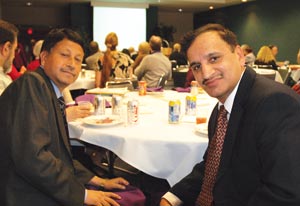University Communications and Marketing
Professor from India sees opportunity in visit to MSU Billings
June 19, 2008
Contacts:
Dan Carter, University Relations, 657-2269
Expanded relationships pursued through College of Business
MSU BILLINGS NEWS SERVICES — When Javed Akhtar arrived in Billings, the landscape that unfolded around him — the majestic Rimrocks, the vastness of the sky and the majesty of the Yellowstone River — was naturally impressive.
But what he saw by the time he left a few months later was equally notable: opportunity.
 Small in stature but large in vision, the economics professor from the University
of Allahabad in northern India spent two months this spring as a visiting lecturer
at Montana State University Billings. He was able to provide lectures to students,
give his insights to members of the College of Business Advisory Board and make connections
to a few area businesses.
Small in stature but large in vision, the economics professor from the University
of Allahabad in northern India spent two months this spring as a visiting lecturer
at Montana State University Billings. He was able to provide lectures to students,
give his insights to members of the College of Business Advisory Board and make connections
to a few area businesses.
“When I’m back at home, I’ll build relationships with those institutions,” Akhtar said in an interview recently before his tour of Yellowstone National Park and departing for India. “I’d like to start an exchange program for faculty and students so they can visit our top business schools.”
Akhtar came to MSU Billings at the behest of Dr. Rakesh Sah, an assistant professor of finance at the MSU Billings College of Business. The two men attended college together in India and reconnected when Sah hosted a trip to India three years ago.
Sah said that that he thought MSU Billings students would benefit from an Indian scholar knowledgeable about international business issues, the agricultural situation in India and biofuels.
“We have relationships with Japan and China, so India seemed to be the next logical step,” Sah said.
India is the second most populous country in the world, with 1.1 billion people and the globe’s biggest democracy. Its economy is growing by leaps and bounds and is competing with China for intellectual, economic and technological advancement. A study by the McKinsey Global Institute suggests that if India can achieve 7.3 percent annual growth — a reasonable assumption if economic reforms continue — consumer spending will quadruple and will be powered by a middle class that will grow from 50 million to 583 million people.
Akhtar said that the newfound economic growth also has its challenges. Economic planning, development and food policy will take center stage, he said, as India’s leaders will be forced to contend with environmental problems and poverty.
“The middle class in India is growing, but 650 million people are poor,” he said.
For context, that number is more than twice the current resident population of the United States as estimated by the U.S. Census Bureau.
During his discussions with students and faculty at the College of Business and with economists at the university’s Center for Applied Economic Research, Akhtar talked about some of the differences between United States and India as they relate to agricultural economics and food distribution. Most notably, he pointed out:
-
Like America, India is moving forward with development of ethanol fuel. But India uses sugar cane while America uses corn. And unlike America, where increased corn production for ethanol puts upward pressure on food prices, sugar cane in India does not have a similar effect.
-
The food subsidy system in India is focused on delivery of surplus crops and not on choice. Those who qualify for food subsidies in India are directed to specific specialty stores to receive their rice, wheat and sugar. In America, those who qualify for subsidies can choose commodities and where they receive them.
Dr. Gary Young, the dean of the College of Business, said he was impressed with Akhtar’s ability to engage students and is optimistic that new relationships can be built with India in the future. In fact, he and Dr. Mike Campbell, department chair and professor of accounting, are working on a possible tour of India in late December and early January 2009 that would be open to faculty, students and local business leaders.
“One of the strategic initiatives for the College of Business is to enhance our internationalization,” Young said. “This relationship and the opportunities we are investigating are some of the activities we’re involved in to reach that goal.”
Young pointed out that the research and scholarly work of faculty in the MSU Billings College of Business relating to alternative energy and international business was of particular interest to Akhtar.
For his part, Akhtar left for India with a pocket full of business cards and new contacts, including environmental companies HydroSolutions and Floating Island International, which specializes in water quality improvement.
“I’m bringing back ideas that can help clean our rivers,” he said. “It was very interesting.”
PHOTO ABOVE: Javed Akhtar, left, and Dr. Rakesh Sah, assistant professor of finance at the MSU Billings College of Business, at a college advisory board meeting this spring
